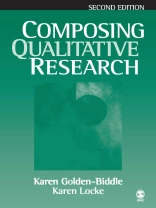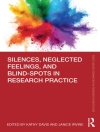Organized around an extended metaphor of ‘story, ‘ this book provides both theoretical and practical guidance for students and researchers who need to transform their qualitative data into a coherent manuscript (essay, dissertation, article for publication, professional writing, etc.). Each chapter covers a different aspect of creating a story: finding the intended audience, crafting and developing the storyline, characterizing the storyteller, and rewriting the story for publication. Composing Qualitative Research is highly recommended for professionals and students across the social sciences and management.
Key Features:
- Now expanded, Chapter 5 takes an extensive look at manuscripts prior to publication.
- The text offers useful strategies for addressing the writing issues that researchers face when shepherding a manuscript from invention to publication.
- The book includes real-world examples drawn from many disciplines and publications to demonstrate styles, concepts, challenges, and potential outcomes from writing qualitative research.
- The work features an expanded list of additional reference materials (online guides included).
Jadual kandungan
Introduction
Writing about Writing
Writing our Fieldwork
Focus on “Story”
Organization of Chapters
The Style and Practice of Our Academic Writing
The Predominant Style of Academic Writing: Unadorned and Disembodied
Experiencing the Practice of Academic Writing
The Style and Practice of Academic Writing: Interested and Persuasive Discourse
Our Writing Task
Crafting a Theorized Storyline
Establishing Theorized Storylines
Developing the Theorized Storyline
Compelling Beginnings
Novel Use of Methodology
Data-Theory Coupling
Storylines with Field and Theory Complications
Characterizing the Storyteller
Storyteller in the Guise of Institutional and Human Scientist
Institutional and Human Storyteller in Relationship to the Studied
Institutional and Human Portrayals as Technically Competent Storyteller
Institutional and Human Scientist as Field Knowledgeable Storyteller
Re-Writing the Story
Re-writing the Manuscript Prior to Journal Review
Re-writing the Manuscript During the Journal Review Process
Re-writing the Articulated Theorized Storylines
Reflections on the Re-Written Manuscripts
Conclusion
Concluding Comments
Appendix: Articles Used as Illustrations
References
Index
About the Authors
Mengenai Pengarang
Karen Locke is W. Brooks George Professor of Business Administration at the College of William and Mary’s school of business, where she is a member of the management area. She joined the faculty there in 1989 after earning her Ph.D in organizational behavior from Case Western Reserve University. Her work focuses on developing a sociology of knowledge in organizational studies with an emphasis on the production of scientific texts and on the use of qualitative research for the investigation of organizational phenomena. She has published in journals such as Academy of Management Journal, Organization Science, and Studies in Organization, Culture and Society, and has authored Grounded Theory In Management Research. Her current work continues her interest in the processes of qualitative researching and focuses on exploring and explicating their creative and imaginative dimensions. Karen also serves as an associate action editor for Organizational Research Methods and as a member of the editorial board of Academy of Management Journal.












